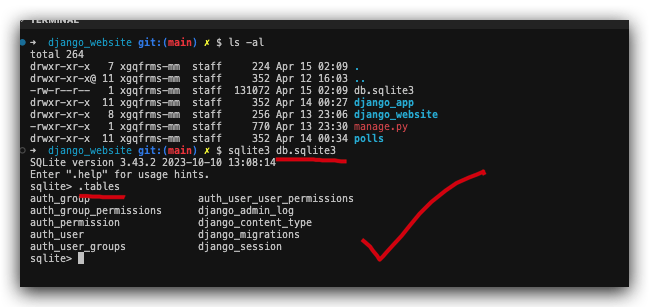Django & SQLite All In One
Django & SQLite All In One
Python & database
# python 3.11 & django 5.0.4
$ python manage.py migrate

$ cd django_website
$ ls -al
total 264
drwxr-xr-x 7 xgqfrms-mm staff 224 Apr 15 02:09 .
drwxr-xr-x@ 11 xgqfrms-mm staff 352 Apr 12 16:03 ..
-rw-r--r-- 1 xgqfrms-mm staff 131072 Apr 15 02:09 db.sqlite3
drwxr-xr-x 11 xgqfrms-mm staff 352 Apr 14 00:27 django_app
drwxr-xr-x 8 xgqfrms-mm staff 256 Apr 13 23:06 django_website
-rwxr-xr-x 1 xgqfrms-mm staff 770 Apr 13 23:30 manage.py
drwxr-xr-x 11 xgqfrms-mm staff 352 Apr 14 00:34 polls
# sqlite3 database_name ✅
$ sqlite3 db.sqlite3
SQLite version 3.43.2 2023-10-10 13:08:14
Enter ".help" for usage hints.
# .tables ✅
sqlite> .tables
auth_group auth_user_user_permissions
auth_group_permissions django_admin_log
auth_permission django_content_type
auth_user django_migrations
auth_user_groups django_session
# .exit ✅
sqlite> .exit

SQLite
CLI /
Command LineShell For SQLite
$ which sqlite3
# /usr/bin/sqlite3
# SQLite 3.43.2
$ sqlite3
SQLite version 3.43.2 2023-10-10 13:08:14
Enter ".help" for usage hints.
Connected to a transient in-memory database.
Use ".open FILENAME" to reopen on a persistent database.
# help
sqlite> .help
.archive ... Manage SQL archives
.auth ON|OFF Show authorizer callbacks
.backup ?DB? FILE Backup DB (default "main") to FILE
.bail on|off Stop after hitting an error. Default OFF
.cd DIRECTORY Change the working directory to DIRECTORY
.changes on|off Show number of rows changed by SQL
.check GLOB Fail if output since .testcase does not match
.clone NEWDB Clone data into NEWDB from the existing database
.connection [close] [#] Open or close an auxiliary database connection
.databases List names and files of attached databases
.dbconfig ?op? ?val? List or change sqlite3_db_config() options
.dbinfo ?DB? Show status information about the database
.dump ?OBJECTS? Render database content as SQL
.echo on|off Turn command echo on or off
.eqp on|off|full|... Enable or disable automatic EXPLAIN QUERY PLAN
.excel Display the output of next command in spreadsheet
.exit ?CODE? Exit this program with return-code CODE
.expert EXPERIMENTAL. Suggest indexes for queries
.explain ?on|off|auto? Change the EXPLAIN formatting mode. Default: auto
.filectrl CMD ... Run various sqlite3_file_control() operations
.fullschema ?--indent? Show schema and the content of sqlite_stat tables
.headers on|off Turn display of headers on or off
.help ?-all? ?PATTERN? Show help text for PATTERN
.hex-rekey OLD NEW NEW Change the encryption key using hexadecimal
.import FILE TABLE Import data from FILE into TABLE
.import FILE TABLE Import data from FILE into TABLE
.indexes ?TABLE? Show names of indexes
.limit ?LIMIT? ?VAL? Display or change the value of an SQLITE_LIMIT
.lint OPTIONS Report potential schema issues.
.log FILE|on|off Turn logging on or off. FILE can be stderr/stdout
.mode MODE ?OPTIONS? Set output mode
.nonce STRING Suspend safe mode for one command if nonce matches
.nullvalue STRING Use STRING in place of NULL values
.once ?OPTIONS? ?FILE? Output for the next SQL command only to FILE
.open ?OPTIONS? ?FILE? Close existing database and reopen FILE
.output ?FILE? Send output to FILE or stdout if FILE is omitted
.parameter CMD ... Manage SQL parameter bindings
.print STRING... Print literal STRING
.progress N Invoke progress handler after every N opcodes
.prompt MAIN CONTINUE Replace the standard prompts
.quit Stop interpreting input stream, exit if primary.
.read FILE Read input from FILE or command output
.recover Recover as much data as possible from corrupt db.
.rekey OLD NEW NEW Change the encryption key
.restore ?DB? FILE Restore content of DB (default "main") from FILE
.save ?OPTIONS? FILE Write database to FILE (an alias for .backup ...)
.scanstats on|off|est Turn sqlite3_stmt_scanstatus() metrics on or off
.schema ?PATTERN? Show the CREATE statements matching PATTERN
.separator COL ?ROW? Change the column and row separators
.session ?NAME? CMD ... Create or control sessions
.sha3sum ... Compute a SHA3 hash of database content
.shell CMD ARGS... Run CMD ARGS... in a system shell
.show Show the current values for various settings
.stats ?ARG? Show stats or turn stats on or off
.system CMD ARGS... Run CMD ARGS... in a system shell
.tables ?TABLE? List names of tables matching LIKE pattern TABLE
.text-rekey OLD NEW NEW Change the encryption key using hexadecimal
.timeout MS Try opening locked tables for MS milliseconds
.timer on|off Turn SQL timer on or off
.trace ?OPTIONS? Output each SQL statement as it is run
.version Show source, library and compiler versions
.vfsinfo ?AUX? Information about the top-level VFS
.vfslist List all available VFSes
.vfsname ?AUX? Print the name of the VFS stack
.width NUM1 NUM2 ... Set minimum column widths for columnar output
sqlite>
# exit
sqlite> .exit
# create a new SQLite database named "db1" with a single table named "tb1", you might do this:
$ sqlite3 db1
SQLite version 3.36.0 2021-06-18 18:36:39
Enter ".help" for usage hints.
sqlite> create table tb1(one text, two int);
sqlite> insert into tb1 values('hello!',10);
sqlite> insert into tb1 values('goodbye', 20);
sqlite> select * from tb1;
hello!|10
goodbye|20
sqlite>
The sqlite3 program looks for a semicolon to know when your SQL command is complete.
sqlite> CREATE TABLE tb2 (
...> f1 varchar(30) primary key,
...> f2 text,
...> f3 real
...> );
sqlite>
SQLite 教程
https://www.runoob.com/sqlite/sqlite-tutorial.html
# https://www.sqlite.org/download.html
$ tar xvzf sqlite-autoconf-3071502.tar.gz
$ cd sqlite-autoconf-3071502
$ ./configure --prefix=/usr/local
$ make
$ make install
https://www.runoob.com/sqlite/sqlite-installation.html
demos
django
models
from django.db import models
class Band(models.Model):
"""A model of a rock band."""
name = models.CharField(max_length=200)
can_rock = models.BooleanField(default=True)
class Member(models.Model):
"""A model of a rock band member."""
name = models.CharField("Member's name", max_length=200)
instrument = models.CharField(
choices=(
("g", "Guitar"),
("b", "Bass"),
("d", "Drums"),
),
max_length=1,
)
band = models.ForeignKey("Band")
https://docs.djangoproject.com/en/stable/topics/db/models/
(🐞 反爬虫测试!打击盗版⚠️)如果你看到这个信息, 说明这是一篇剽窃的文章,请访问 https://www.cnblogs.com/xgqfrms/ 查看原创文章!
refs
https://docs.djangoproject.com/en/5.0/intro/tutorial02/
https://www.djangoproject.com/start/
©xgqfrms 2012-2021
www.cnblogs.com/xgqfrms 发布文章使用:只允许注册用户才可以访问!
原创文章,版权所有©️xgqfrms, 禁止转载 🈲️,侵权必究⚠️!
本文首发于博客园,作者:xgqfrms,原文链接:https://www.cnblogs.com/xgqfrms/p/18135039
未经授权禁止转载,违者必究!


